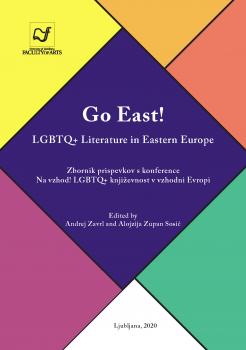Go East! LGBTQ+ Literature in Eastern Europe
Keywords:
queer literature, non-heterosexual identities, literary studies, heterosexual matrix, East/West divideSynopsis
Collection of scholarly papers Go East! LGBTQ+ Literature in Eastern Europe is the outcome of the international conference at the Faculty of Arts in Ljubljana (organised in collaboration with ŠKUC in October 2018). It includes 20 thematically varied chapters on LGBTQ+ literature in the so-called European East. They cover Bosnian, ancient Greek, Croatian, Italian, Hungarian, Slovak, Polish, Russian, Ukrainian, and Slovenian literatures (as well as criticism and linguistics) in comparative contexts. The main issues raised by the majority of the contributions are the attitudes of Eastern Europe towards the LGBTQ + literary texts and the perception of the literature by readers and literary studies. Although the chapters included in the book differ, they share interest in linking identity crisis to social crisis, detecting queer elements, condemning homophobia and violence in general, exposing the repressiveness of the heterosexual matrix, and language and formal innovations in the texts under consideration. The interdisciplinary nature of the papers is extremely valuable, as it fills the significant gap in current literary, cultural, anthropological, and sociological studies.
Chapters
-
Foreword
-
LGBT Literature in Eastern EuropeA View from the West
-
Comparative Analysis of Two Texts for Young Adults, Dečki [Boys] and Fantje iz gline [The Clay Boys]
-
In Search of Territories of FreedomIvan Kozlenko’s Novel Tanzher and the Queer Challenge to the Ukrainian Canon
-
Queer Emotions? The Narrative Shape of Feelings in Noben glas by Suzana Tratnik and Eskorta by Michal Hvorecký
-
Wartime Memories from East and WestThe Construction of George Faludy’s Gayness
-
Sappho Was Not a PoetThe Sonoric Character of Poetry and Its Emancipatory Potential
-
Jozef Pronek’s UnderwearDisplacement, Queer Desire, and Eastern European Masculinity in Aleksandar Hemon’s Nowhere Man
-
(Post)Communist Queer Identities in Uroš Filipović’s Staklenac and Michał Witkowski’s Lovetown
-
“If a Cutie, Then Always Misha”Evgenii Kharitonov’s Queer Masculinities
-
The Subversive Construction of Gender in the Poetry of Kristina Hočevar
-
Reconceptualising the Russian LGBTQ+ CommunityThe Impact of Russia’s ‘Gay Propaganda’ Laws on LGBTQ+ Discourse
-
Zygmunt Mycielski’s Blues, or How Some Testimonies Related to Queer History Simply Vanish into Thin Air
-
Camp Kharitonov and Russian Gay Identity
-
Criticism in the Closet
-
Warm, Blue and BulgarianThe Development and Diffusion of Three Expressions to Denote a “Male Homosexual” in Central and Eastern European Languages
-
Lesbian Poetry Tradition
-
The Language of Mystery in One of Witold Gombrowicz’s Stories
-
Boys and CriticsThe Reception of the First Slovenian Homoerotic Novel as a Reflection of Sociocultural Changes
-
Slovenian LGBTQ Narrative in the New Millennium
-
The Apparitional Gay and the Invisible Everyone Else – LGBTQ+ Identities in Contemporary Croatian Playwriting
Downloads


